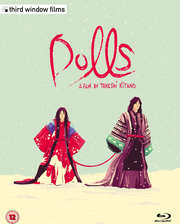Review for Dolls
Introduction
We come to the third of the Takeshi Kitano films that Third Window are bringing to Blu-ray in restored and re-mastered form this year, and it’s also the most esoteric of the three. Hana-bi was a hard-boiled cop thriller with an unexpected heart, pretty much what you might expect from Takeshi Kitano, and that was followed by Kikujiro, a children’s adventure movie with a difference. Dolls sees Takeshi Kitano behind the camera, serving as writer, director and editor, as he muses on the subject of love. Of course this isn’t love as the positive, life affirming force that we usually expect from cinema. This is love as a destructive emotion, tinged with obsession, or regret or guilt. Three such love stories play out in Dolls.
Matsumoto should have been on easy street. When his company boss wants him to marry his daughter, the prestige and status is perfect for Matsumoto’s family. Unfortunately he was engaged to Sawako, and had to break that off. Sawako reacted by attempting suicide, an overdose that she survives but without her sanity. Matsumoto learns of this on the day of the wedding, and leaves to go and be with Sawako, to take care of her.
Hiro is a successful Yakuza boss, now retired, although the crime business isn’t what it used to be, as he relates to his new bodyguard. But even now, yakuza make sacrifices for their illicit careers. Years previously, Hiro held a normal job in a factory, and was courting a young girl named Ryoko. But when the factory faced bankruptcy, he chose to join a gang instead, and he broke things off with Ryoko, unwilling to take her into that life. But Ryoko promised to wait for him.
Nukui is a fan of the pop star Haruna Yamaguchi. He’s supported her through her career, bought all of her records and merchandise, been front and centre at her concerts, fan signings and special events, one of the faithful that Haruna knows by name. But then Haruna is involved in a car accident that ends her career, suffering an injury that sends her into seclusion, unwilling to see her fans. Nukui knows that there is only one way that he can be in her presence again, and he takes drastic action.
Picture
Dolls gets a 1.85:1 widescreen 1080p transfer on this disc, and in terms of visual quality and the results of the 2k restoration, this is the best of the three films, although Hana-bi and Kikujiro were not exactly slouches in the visual department. It’s just what you would want from a Blu-ray restoration, faithful to the film source, retaining the requisite film grain, but stable and free of age and print damage throughout. Colours are strong and consistent throughout, while detail levels are excellent, with no sign of compression, moiré or digital banding. Dolls is the most visually oriented of the three films, where imagery and composition is far more integral to the story than simple textual narrative. You can wheel out the ‘any frame can be a work of art hanging on a wall’ cliché as it truly applies here, and the rich colour palette (pushing red in particular as far as it can safely go), makes the most of the wonderful costume design, and the fantastic locations. One small issue is a scene, around 9 minutes in, of two friends talking outside a church. This cut is a little jerky, as if something is wrong with the frame rate, but it appears to be an issue with the source.
The images in this review were kindly supplied by Third Window Films.
Sound
You get a DTS-HD MA 5.1 Surround Japanese soundtrack here, with optional translated English subtitles. It’s one of those soundtracks that is quietly immersive, rather than more obviously so, and this is a film of gentle ambience rather than strident sound design. The dialogue is clear throughout, and the subtitles are timed accurately and are free of typographical error. It does feel like a mostly front-focussed affair, but the surrounds do come to life from time to time, most notably for Haruna’s pop song. Oddly enough, Joe Hisaishi’s soundtrack didn’t really register with me, certainly not the way it does in Kikujiro, but it obviously works well enough with the film.
Extras
Dolls presents its content with an animated menu. It also comes with a host of extra features, all of them presented in 720p format.
Interview with Director Takeshi Kitano Pt. 1 lasts 15:04, and Pt 2 lasts 14:25. The first part is an interview that was contemporaneous with the film’s release, while the second part is a more recent retrospective interview.
The Interview with Costume Designer Yohji Yamamoto lasts 10:01, and unlike the other interviews on the disc, is conducted in English; no subtitles here.
There are also interviews with the two leads, Miho Kanno (3:55), and Hidetoshi Nishijima (3:39).
Scenes From the Shoot Footage lasts 18:04, and is essentially b-roll footage, with no context, voiceover, or subtitles for overheard dialogue.
Venice Film Festival 2002 is a similar piece of content, behind the scenes footage of the film’s presentation at the festival with the director and cast attending. This lasts 8:02.
Finally the Original Japanese Trailer lasts 1:40, and offers a chance to compare and contrast with the restored film.
Conclusion
I’m enough of an anime nut to be well acquainted with the ‘Red String of Fate’, a subject that director Takeshi Kitano refers to in the interview on the disc. It’s a frothy piece of Japanese folklore, that you are connected to your potential soul mate by an invisible red thread linking your pinky fingers. It’s a hopeful, romantic vision. The start of Dolls sees protagonists Matsumoto and Sawako literally bound together by a thick red rope, a vision of romantic love become burdensome and obligatory. Matsumoto and Sawako’s story reaches through the film, binding together the other two tales, with the film bookended by a piece of Bunraku theatre, a tragic love story told through the medium of puppeteered dolls.
As someone who is more at home with conventional narrative, Dolls is a little out of my comfort zone, a film that tells its story through imagery and emotion, not bound by linear storytelling and exposition. It is a highly evocative and effective film in provoking empathy and understanding in the viewer, and I have to say that I was invested in all three of the stories, despite the heartbreaking inevitability that they wouldn’t have happy endings. As I mentioned before, this is the other side of love, the obsession, guilt and regret that can come with devoting oneself wholly to another.
Matsumoto had the perfect life with Sawako, but made one mistake, succumbing to peer and parental pressure to marry for status instead. That one mistake has lasting consequences, when Sawako fails in a suicide attempt that leaves her with permanent brain damage. Thereafter Matsumoto is motivated, perhaps by guilt, perhaps by love, to care and tend for her, although that does mean jilting his second fiancée in turn, and alienating himself from his family. He begins with a handful of money, enough for a hotel room, but they wind up living out of his car, and when that becomes impossible, eventually wandering the country as a pair of vagrants. Sawako’s become childlike, and is fascinated by anything that catches her attention, and has a tendency to wander off, getting into trouble. So Matsumoto uses the expedience of simply binding them together with a rope, and so they wander through the film, sharing experiences as they explore the country. As they ramble, the film shifts from season to season, and from location to location, the sea, the forests, the mountains, wonderful autumnal trees, a windswept beach, snow covered slopes, all of which is breathtaking and enchanting on Blu-ray.
They also briefly pass by the other characters in the film, tenuously linking the stories together. Hiro’s tale is one of regrets, having broken up with his girlfriend to join the yakuza; the last thing she said to him was that she would wait, every weekend on the same park bench, having prepared packed lunch for them both. Now that he has retired, he chances upon the same park, and finds that she is actually still waiting even after all this time. But it quickly becomes clear that she is waiting for the boy that left on that day, and that she doesn’t recognise Hiro at all now. Even so, you might expect that they could have a second chance, and they do start spending time together on that bench. But while Hiro gave up his normal life to become a yakuza, at the other end of his life it becomes clear that the life of a criminal is less easy to let go of.
Nukui’s tale is one of obsession; the rabid fandom that has those in the public eye worrying about stalkers and taking out injunctions. The life of an idol is more proscribed and regimented in Japan, with fan interaction somewhat mandatory, the sense that fans actually own the object of their obsessions. Nukui is one of the hardcore fans that has been worshipping Haruna from the beginning; his home is practically a shrine to her, so that when she leaves show business after suffering a disfigurement in a car crash, he takes it pretty hard. His obsession drives him to extremes to meet Haruna one more time, a girl who has made it clear that she has no intention of being seen by her fans any more. Nukui’s solution is drastic, and ill-fated.
Guilt, regret, and obsession, aspects of love that aren’t commonly explored in cinema, but in Dolls they are at the centre of the film. You might expect that such aspects would result in something violent and traumatic, confrontational and ugly, but in Dolls, Takeshi Kitano creates something that while it touches on these things, is still gentle, poetic, and inarguably beautiful. This is a film that can take you to some dark places in the human psyche, but you still wind up having a positive experience in the process. Dolls is a film that will stay with you long after the end credits have rolled.









































Your Opinions and Comments
Be the first to post a comment!